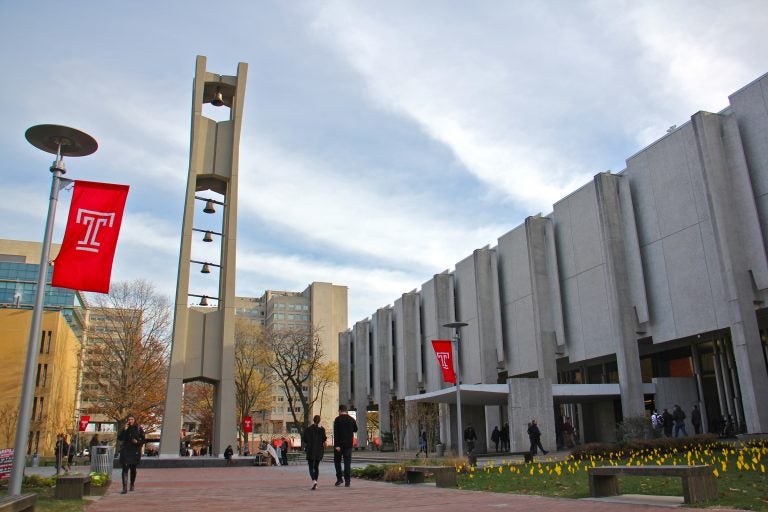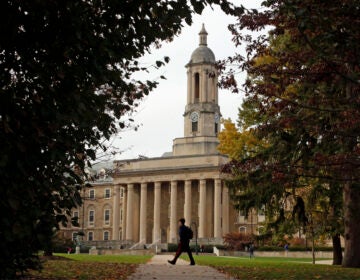Tuition hikes set for most Pennsylvania public colleges

Students walk past Samuel Paley Library on the Temple University campus (Emma Lee/WHYY)
Pennsylvania’s public universities have set their budgets and tuition rates for the coming school year.
These include the 14 state-owned institutions and the four “state-related” schools — Penn State, Pitt, Temple and Lincoln universities.
All of the public universities received a three percent increase in state appropriations this year. But despite a call to keep tuition rates level from Pennsylvania House Speaker Mike Turzai, the incremental increase isn’t enough to cover expenses at the schools, and as a result students will pay more.
The 14 state-owned schools that make up the Commonwealth’s State System of Higher Education saw a three percent tuition hike.
Kenn Marshall, spokesman for the system, says even with the additional funding, it left them with a $50 million shortfall.
“The only two ways we have to make that up is through tuition increase or budget cuts, and the board chose a combination of the two,” he said. “The [2.99 percent] tuition increase is going to be the second lowest tuition increase in more than a decade.”
He says universities such as West Chester and Millersville still have to come up with about $20 million in combined cuts to balance their budgets.
“Our state funding increases actually have not even covered our pension cost increases over that same time period. We have to keep looking for other ways to control our costs,” Marshall said.
He says the system has implemented cost-saving measures like energy conservation projects and a redesigned health care plan.
“For the first time in anyone’s memory, our health care costs are actually going to decrease this year by almost a million dollars. That’s a result of the negotiations we had with our unions a couple years ago,” he said.
The state-owned universities have increased tuition for the past 10 years, during which the system saw cuts or flat state funding for seven of those years.
Base in-state tuition at the 14 state system universities is currently $7,716.
Turzai, who appointed himself to the Pennsylvania State System of Higher Education Board of Governors last month, released a statement after the General Assembly’s state budget vote in June. He called on the state-owned and state-related universities to not increase tuition or room and board.
State-related universities receive state funding but are not governed by the state legislature.
Temple is increasing tuition by two percent. The annual undergraduate base tuition will be $16,080 for Pennsylvania residents.
Lincoln University plans a 2.5 percent hike for incoming freshmen. Sophomores, juniors and seniors will pay the same rate when they entered as freshmen.
Charles Gradowski, vice president of finance and administration at Lincoln, says their fixed tuition model keeps the same rate for four years and helps students feel confident how much their education will cost.
The fixed tuition model is in its fifth year at Lincoln, which has increased for each incoming class.
“At this point in time we have actually more students than we can actually house at campus,” he said.
He said it’s difficult to be certain the increases in enrollment and better retention rates or graduation rates are tied to the tuition plan.
Gradowski says that families knowing the remaining cost of college in advance can be a relief to students and families. After four years, a student’s tuition rate is no longer protected.
“There was always a hue and outcry,” he said when tuition is raised. “But that’s all been eliminated at the school … [Students] don’t have an expectation like others have of getting an increase. So that part of it has worked, as well as, with both retention and with graduation rates and with admissions.”
Pitt did not raise tuition for in-state undergraduate students at any of its five campuses, keeping costs in the $17,600 to $22,900 range, depending on the major.
Penn State will vote on Friday at its Board of Trustees meeting but is expected to have a tuition freeze — only its second in 50 years.
It would be the second tuition freeze in four years, with two years of tuition increases in between. The land-grant institution has not raised in-state tuition for undergraduates at eight of its 19 campuses for the last three years.
WHYY is your source for fact-based, in-depth journalism and information. As a nonprofit organization, we rely on financial support from readers like you. Please give today.




